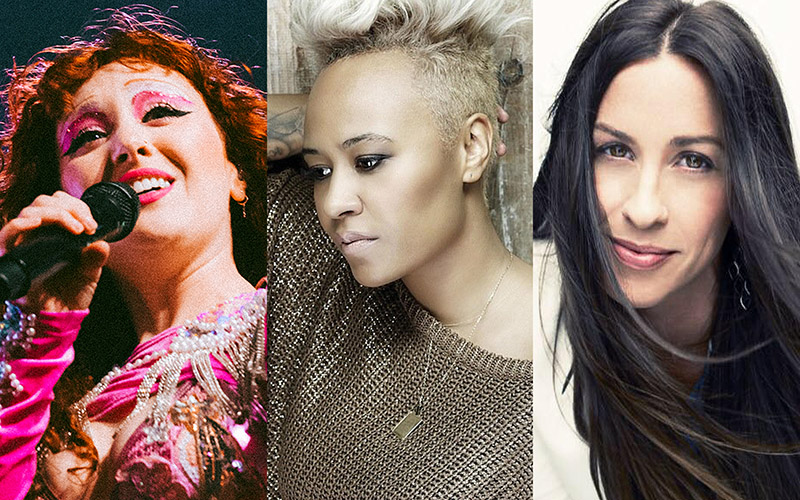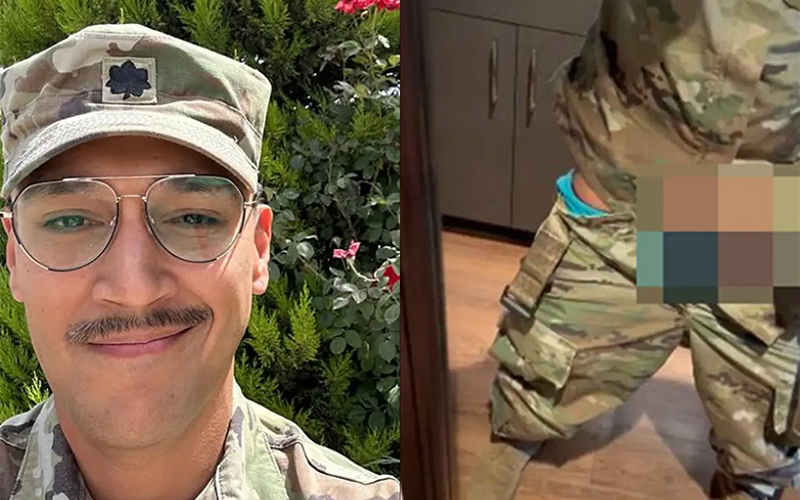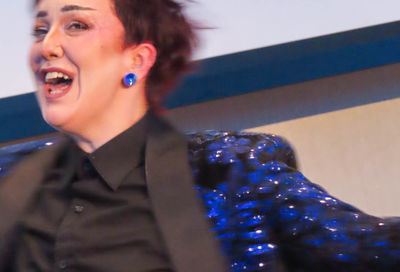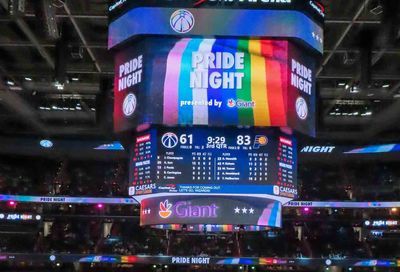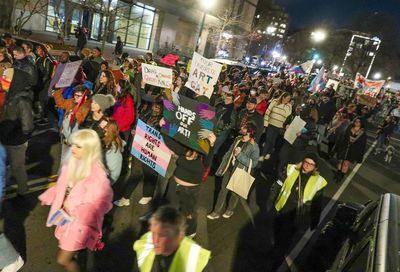Spreading the Word
When Pam Grier talks, you are going to listen
Pam Grier enjoys being something you don’t expect.
She is, after all, the iconic star of such ’70s blaxploitation action classics as Coffy and Foxy Brown. Low-budget, quickly shot, and unprecedented in their creation of a strong, black, frankly bad-ass female hero, the films created a lasting, tough-chick persona for Grier.
While her star may have faded somewhat during the 1980s, her Quentin-Tarantino-created comeback, Jackie Brown, cemented her place in the cream of the cultural crop. Ten years later, she’s starring in the groundbreaking Showtime series The L Word.
So you may expect a certain amount of urban grit and attitude when settling in for a chat with Grier. And, naturally, you’d be wrong.
The 57-year-old Grier laughs that she was late calling for the interview — she had tried to call in from her horse barn, but the phone’s batteries were dead. It’s snowing at her farm in rural Colorado, where you only find a house every 100 acres or so.
”I’m in my sweats now — how elegant!”
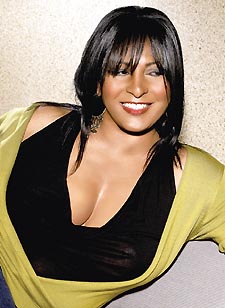 Grier |
Not the life you might expect from the former ”baddest one-chick hit squad that ever hit town,” but it’s a life she loves. Splitting her time between Colorado and Los Angeles, where The L Word shoots, Grier likes to focus on her work with animal rescue, tutoring urban kids or raising money with her women’s polo team, ”Chicks with Sticks.”
”Everyone says, ‘She must be crazy, she’s a recluse, she lives way out of the city, she drives a pickup truck on a dirt road, something must be wrong with her. She can’t be African American,”’ laughs Grier.
Grier will be in D.C. this weekend, along with Cybill Shepherd and Marlee Matlin, to accept SLDN’s Randy Shilts Award to The L Word for the show’s inclusion of a ”gays in the military” story line. While it’s unlikely she’ll be in her barnyard sweats, it’s certain she’ll be every bit the iconic presence you would expect her to be.
METRO WEEKLY: Tell me a little about your experience on The L Word.
PAM GRIER: It has been so great, so enormous, exceeding my expectations. I’ve learned so much by doing this show — from [creator] Ilene [Chaiken], from the cast members, the issues that we touch upon, and particularly with [my character,] Kit [Porter]. Even though she hit bottom, she has supported her lesbian sister, Bette, played by Jennifer Beals. You should be entitled to love whomever you wish. That’s Kit’s point and Ilene has helped us guide that.
Some people feel that you can go back and forth –there could be a straight woman and a lesbian woman who just happen to have an unbelievable crush on one another because they like each other for their issues, their spontaneity, their lives, their beliefs, their education, their brains — how would they be able to have a relationship? Which is possibly the area where Kit is going because she’s considered to be straight, or could she be bisexual?
So there’s no definitive line. In some cases there are, but the line is broad of who is lesbian and who’s transgender, who’s bisexual, who’s 50 percent, who’s 20 percent — I’ve learned that it’s not about the person’s sexuality, it’s about their character, their being. I’m immersed with some of the greatest people I’ve met in my life: lesbian, gay, transgender. And I’m more educated and able to come up with ideas for the show, laugh at the show, cry with it.
I’m enjoying it: the performances, the actors and directors, and the voices of so many women. Whether they’re straight, lesbian or bisexual, we women still haven’t gotten our voices heard. Women have microcosms of strength in some cities, some demographics, where their issues are addressed, but as a whole, what I see is the direction of the whole women’s movement returning to the 1970’s. It was divided in the ’80s and ’90s, and now it’s returning to where straight and lesbian women are uniting and gaining economic and political leverage that will help all the communities.
 Pam Grier with Kelly Lynch in ‘The L Word’ (Photo by James Dittiger / Showtime Networks, Inc) |
MW: I’ve been familiar with your image and your fame since I was a kid back in the ’70s and through the ’80s, which makes me assume you’ve had a pretty large gay fan base given that you’ve had a sort of iconic presence in the culture. Has that been your experience?
GRIER: Yes, I do have that. And it’s growing. I’ve always had it because I’ve always respected a wide spectrum of fans. I’ve never been exclusive because I am a woman of color with many, many backgrounds in my family that go all the way to the Philippines, to Europe, to Africa, to Romania. I grew up with people of many religions and races and I’ve just never been exclusive. You understand that women of color have been marginalized, and marginalized way before the ’70s, so to have any tiny bit of recognition of my work [was wonderful].
MW: I know that both as a kid and as an adult I found myself attracted to this image you’ve had. What was it about you or your persona that drew that attention? Not every actress gets that kind of gay allegiance.
GRIER: I don’t have a crystal ball, but it could be the fact that [those characters] fight — she puts her neck out on the line for others. She’s not a sacrificial lamb, but she will walk through the fire. She always fought for the underdog, and didn’t take a lot seriously — but what was supposed to be taken seriously, I did and the character did.
We didn’t have a lot of women on screen then fighting for the underdog. In our communities we did, but it was never reflected on screen. Thank God, American International Pictures and [Coffy and Foxy Brown director] Jack Hill had this great respect for women and sexuality.
MW: You stood out a lot during those earlier days because that type of character was a new thing in many ways. Has that changed?
GRIER: I think the woman are more educated, which gives them strength. Today, women have much more to take advantage of. Women aren’t afraid as much as they used to be, and society told them to be. I grew up having the best of three worlds: military, urban and rural. My mom’s from Wyoming — they were ranchers. My mom married into the military and I saw international war and politics at the age of 6. Then I had the urban, because we couldn’t always live with my dad in these underground bases [where he was stationed]. We sometimes had to live in the city, say D.C. You had [to fight for] voting rights, equal housing, education. [Those fights] opened door for women. Look at Brown vs. the Board of Education — everybody needs an education and that’s what makes people accept other people more.
MW: Given your upcoming appearance at the SLDN dinner, has your own experience in a military family influenced your perspective on gay and lesbian service members?
GRIER: Absolutely. I have many friends in the service. It’s so moving when people say they’re going to sacrifice — possibly even sacrifice their lives — for this country. I feel one must recognize, salute, and honor that, and just say thank you.
MW: Have you talked to or known gay and lesbian service members who have been discharged or has that been part of your work with The L Word?
GRIER: We’ve met a few. Some of the wrenching stories that I’ve been informed of are quite sad. And then to have [chairman of the Joint Chiefs of Staff Gen. Peter Pace] speak of how the gays and lesbians shouldn’t be in the military, especially if they’re openly homosexual, I just thought, ”My God.” But we all know there is a quiet, underground group — growing smaller as we speak — who have these views. But for him as a leader to come out and say that is like saying [gays and lesbians] aren’t needed to take care of their country because they are almost non-human, because of their sexuality.
That’s a very small part of who people are. There are gay and lesbian geniuses who do great things, who have pretty much saved the world with invention, but aren’t allowed to be in the military openly or show affection or have their own gatherings. It doesn’t make sense to me. I just don’t think that was appropriate.
MW: Why do you think that there has been this resistance to gays in the military, even when public support for it keeps growing?
GRIER: Ignorance! Just total ignorance. But people are becoming more and more informed when they see other people relaxing, and not just liberal, Democratic celebrities.
MW: In the profile New York magazine recently did of you, you talked about being tired of the ”laziness” on gay, lesbian and transgender issues.
GRIER: Yeah, I’m tired of people being lazy about reading and being informed. Everyone should be curious and not be lazy. You have to have a curiosity and a non-lazy attitude to say, ”Okay, I respect it. I don’t understand it, but I respect it because I’m more informed than what my preacher or my family told me.”
There was a laziness about allowing black people to vote. They had to march just to sit in a Woolworth. We were on a base in the South with my dad and I was a [a child]. The base gave you an equality because the uniform was all one color — that’s what they preached. But if you went off the base and you wanted to catch a city bus — sometimes we’d stand at the bus stop and the bus would not stop for us when it was 110 degrees. So we were walking from tree to tree, carrying groceries for miles because the buses wouldn’t stop.
MW: You said that the uniform was all one color on the base. Was that the case?
GRIER: Yes, but not really. That’s how they wanted the military to treat one another. We weren’t always ostracized by whites. Some of our best friends were white [non-commissioned officers]. But there were still people who had their beliefs and how they were raised and how they assumed. But they would be highly reprimanded. The military would dock their pay, which hurt. Everyone was supposed to be one, which is supposed to be the principle today.
MW: You seem to draw some parallels between the civil-rights struggle for the black community and the difficulty the gay community is going through right now. There’s controversy in the country and in the black community about whether that’s a valid comparison to draw. Do you feel comfortable drawing that comparison or are there significant differences?
GRIER: There’s microcosms of differences, but, in general, I feel comfortable because the gay and lesbian community is old as time. And a lot of people don’t understand that — they wonder, ”Is it biological, is it a choice, is it from drinking the water?”
Who is the African-American who is pure African and not mixed with their slave owners? They call Tiger Woods black because his mom is Thai and his father is black. Look what they’re going through with Barack Obama. His mom is white, his father is black, and they’re calling him black. Why can’t they just call him a man of color? He’s bi-racial. Halle Berry is considered black because her mom is white and her father’s black.
You know what, I’d like to see you write that down. The comparison, I feel, is a community that’s being ostracized over their sexuality, which is like being ostracized for the color of your skin. You can’t change your skin. You can’t change your sexuality. People are who they are. They know who they are when they’re 7-years-old, if they’re not repressed mentally and culturally by their family or religion. But there is a parallel. And granted, all the parallels aren’t concrete, but there is for me a deep, deep comparison.
I feel that in my time now today I have a greater chance of doing more work. I hope to be that cantankerous grandmother that beats the kids with a broom. [Laughs] When I’m in my 80s and 90s, I’ll see great changes. I know that I will see that. I have seen so much in the last 30 to 40 years of my life that it makes me have a sense of hope. If I can draw people’s attention to what is done and said, to the changes and the new attitudes, if I can carry that beacon on my back — that’s a lot to carry, but then I am one of those chosen.
Support Metro Weekly’s Journalism
These are challenging times for news organizations. And yet it’s crucial we stay active and provide vital resources and information to both our local readers and the world. So won’t you please take a moment and consider supporting Metro Weekly with a membership? For as little as $5 a month, you can help ensure Metro Weekly magazine and MetroWeekly.com remain free, viable resources as we provide the best, most diverse, culturally-resonant LGBTQ coverage in both the D.C. region and around the world. Memberships come with exclusive perks and discounts, your own personal digital delivery of each week’s magazine (and an archive), access to our Member's Lounge when it launches this fall, and exclusive members-only items like Metro Weekly Membership Mugs and Tote Bags! Check out all our membership levels here and please join us today!




